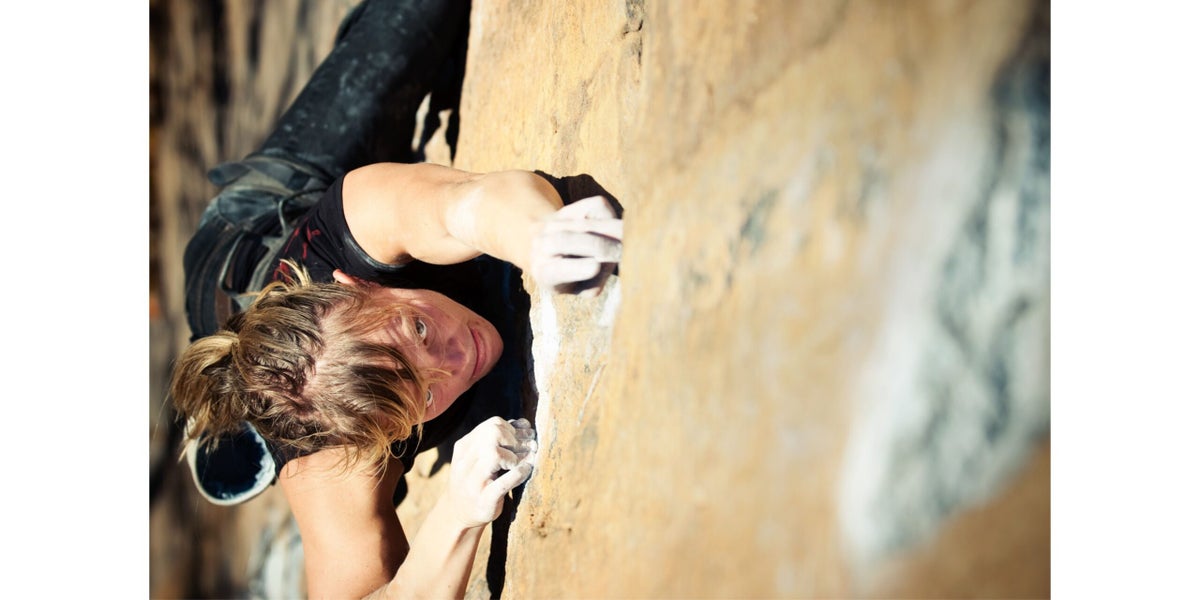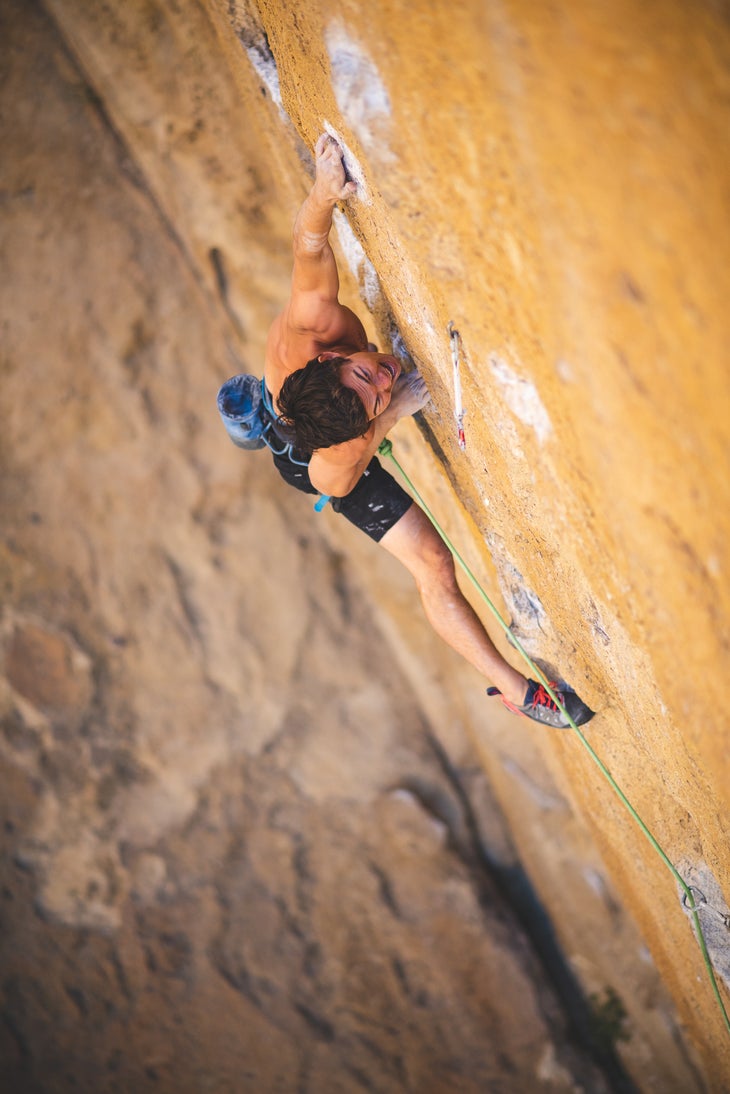Why Are Some Climbers Proud to Not Try Hard?

This story, originally titled “What Happened to All the Dogs?” appeared in our 2024 print edition of Ascent. You can buy a copy of the magazine here.
“What happened to all the dogs?” asked the climbing coach and local gym owner.
I couldn’t help but laugh.
“I’m serious,” he said. “It seems like so many youth teams these days aren’t even serious about training anymore. Having fun is being prioritized over trying hard.”
His question echoed a sentiment my Southern parents love to voice. “Delaney,” they say, “did you ever get anything for free, or did you have to earn it?” There’s no need to answer; of all the things my folks gave me, the pull-yourself-up-by-your-bootstraps ideology was one of the most salient. Climbing, for me, had always been about trying hard. It evokes something deep and primal. Getting stronger is an inherently self-destructive process, necessitating the breakdown of muscle fibers and supporting tissues, mind and spirit. From that destruction comes old meanings.
“Kids these days think everything should be for free,” they continue. “It’s like they don’t even know how to try hard anymore.”
When my parents make comments like this, I can’t help but think of the inhibition of trauma. Trauma from the pandemic. Trauma from the economy, the wars, the climate, the bigotry, the general hatred, the siloing of ideologies and thus people in general. Feelings of isolation and even helplessness. People will probably never be the same, and if there is any truth in these sentiments from the coach and my parents, it is because to try hard means to put your heart on the line for something. Perhaps we’ve seen too much destruction lately. Perhaps we’ve lost our will to tolerate further damage.

I answer my parents’ questions with another: “Doesn’t it seem like things are so much worse than they used to be?”
For every action, there is an equal and opposite reaction. Pandemic-induced burnout has incentivized some people to turn away from achievement culture. We’d had it up to here, tired of low wages, poor benefits, long hours, and the rising cost of living. Having been pushed too far, a line had to be drawn in the sand. Many Americans redefined what mattered, and the endless pursuit of excellence seemingly didn’t make the list, at least not in the way it used to.
Confidence, too, seems in short supply. Several publications indicate that COVID-19 fallout resulted in decreased self-efficacy among students, particularly those transitioning from high school to higher education. Other studies demonstrate an increase in fear and anxiety among adolescents. Still others show that among the same cohort, suicidal ideation increased. It’s fair to extrapolate that, now more than ever, kids want to feel safe and not pressured to leave their comfort zones.
Perhaps one of the best ways to understand culture is through the lens of art. Much has changed in recent years. AI is the obvious example, wherein idiosyncrasies are traded for coded anemia. There’s the shuttering and/or waves of layoffs in the news and literary industries; stories and depth traded for 60-second shorts or 280 characters. Words for noise. Technological advances coupled with social media have, in so many ways, resulted in lower-quality expressions of the human experience.
Are we, in the face of this epidemic of uncertainty, in the habit of exchanging long-term happiness for the short term? Are we, at times, settling to feel safe?
Increasingly, I’m seeing a concept discussed called the death of nuance, wherein people take overly simplistic stances to make a point. I’ll refrain from doing that here and be the first to admit that what’s happening in climbing is far more subtle and complicated than my line of thinking suggests. But something is happening.
Some pros simply won’t suggest grades anymore, likely due to the fear of starting an internet debate or putting a misplaced emphasis on their accomplishment. In the last year, as the editor of this magazine, many filmmakers asked me to write about their videos that “weren’t about the grades” and, in some cases, left them out completely. You don’t have to look hard to find hot take after hot take with titles like “Why Grades Don’t Matter.” Likewise, on Instagram, the sentiment is increasingly expressed. Routesetter and sponsored athlete Adeline Wright wrote: “Grades don’t matter … I really want to express climbing for the fun of it, so that no one hurts others’ feelings with grade-chasing gym culture.”
At Movement Climbing, Yoga & Fitness in Denver’s River North Arts District, a new mural reads, “Community Is Strength.” The multicolored letters are shaped like shoes and mountains, a harness and rope. The mural is bright and jovial, stretching about 15 feet across one of the main walls. On Instagram, the artist wrote, “POV: you are apart [sic] of an amazingly supportive rock climbing gym that values community and fun over sends and gains.”
How we think about the measures of our sport’s objectivity has seemingly fundamentally changed. It’s fair to acknowledge that this redistribution has, in some ways, helped our community expand and thrive. We are bigger, more diverse, and more welcoming than ever, partly because of this renewed focus. However, communal ethos isn’t incompatible with the uninhibited pursuance of better. Rather, chasing grades and strength breeds confidence and mental fortitude, which ultimately feeds back into a more robust community.
On the flip side, many pros continue to voice the importance of thoughtful grade discussion, including Will Bosi’s attempts to define the still-muddied difference between V16 and V17, or Alex Megos’s reluctant downgrading of Chris Sharma’s Sleeping Lion, or James Pearson’s meticulously outlined reasoning for grading Bon Voyage E12. It’s impossible to know which trend rose first: the anti-grade and fun-focused sentiment or the urgency to fine-tune and elevate the quantifiable accomplishments in our system.
The coach I spoke with has noticed this tension playing out among kids. Because it’s always been cool not to care, and perhaps because of where we are as a society, he fears that climbing isn’t going in the right direction. “I think there’s a lot of social pressure at play here,” he said. “I see kids who want to fight and try hard and, when they’re surrounded by so many others who aren’t interested, they’ll willfully water it down.”
Regulated expression, for the purpose of this discussion, is the idea that you can deploy paradoxical mentalities as circumstances demand. What we don’t want to happen is for the kids who are foaming at the mouth to push their limits to inadvertently be told that their passion, their intensity, is misplaced or unhealthy. Climbing both is and isn’t about the grades.
Of course, plenty of climbers out there have more than a dog in ’em. We have too many to count, and they range vastly in ability, gender, age, preferred discipline, and experience level. Think of Bayes Wilder, Beckett Hsin, or Maya Ene. They are our future. Brooke and Natalia are starlets on the World Cup stage. Michaela Kiersch, who has a PhD and has climbed 5.15a and V14, and Paige Claassen, who has climbed several 5.14d’s and is a mom, have shown us that yes, you can have it all. Daniel Woods, Shawn Raboutou, and all the other American boulderers have been opening lines and splitting tips for years. But effort and grade-oriented goals should not be the sole province of professional athletes; I want to see that effort destigmatized at every level of the sport.
Years ago, before my competitions, my dad used to tell me, “Give it some grrrrr!” The phrase was simple yet effective, helping me to denature those internal barriers that would have prevented access to raw willpower. Surrounded by other kids doing the same thing, I felt safe enough to try hard, safe enough to throw myself into climbing, and safe enough to care about it. I quickly learned that specificity matters when it comes to goal setting, so I, personally, used grades and comp results to measure my growth. This directionality isn’t for everyone, and that’s OK. But it changed my life. And I think it can do the same for the next generation of climbers.
To read more from Ascent, visit our table of contents here.
The post Why Are Some Climbers Proud to Not Try Hard? appeared first on Climbing.

